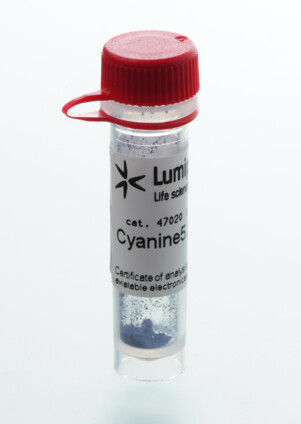Cyanine7 DBCO
| Cat. # | Quantity | Price | Lead time | Buy this product |
|---|---|---|---|---|
| A50F0 | 1 mg |
$125
|
in stock | |
| B50F0 | 5 mg |
$260
|
in stock | |
| C50F0 | 10 mg |
$325
|
in stock | |
| D50F0 | 25 mg |
$510
|
in stock | |
| E50F0 | 50 mg |
$895
|
in stock | |
| F50F0 | 100 mg |
$1490
|
in stock |

Cyanine7 DBCO is a NIR fluorescent dye with cycloalkyne moiety for the conjugation with azides by means of copper-free, strain-promoted alkyne-azide cycloaddition (SPAAC).
Azodibenzocyclooctyne (DBCO or ADIBO) fragment is a stable but active cycloalkyne that reacts very rapidly with azides.
Absorption and emission spectra of Cyanine7 fluorophore

Customers also purchased with this product
General properties
| Appearance: | dark green solid |
| Mass spec M+ increment: | 849.5 |
| Molecular weight: | 885.62 |
| CAS number: | 2692677-77-1 |
| Molecular formula: | C58H65N4ClO2 |
| Solubility: | good in DMF, DMSO, DCM |
| Quality control: | NMR 1H, HPLC-MS (95%) |
| Storage conditions: | Storage: 12 months after receival at -20°C in the dark. Transportation: at room temperature for up to 3 weeks. Avoid prolonged exposure to light. Desiccate. |
| MSDS: | Download |
| Product specifications |
Spectral properties
| Excitation/absorption maximum, nm: | 750 |
| ε, L⋅mol−1⋅cm−1: | 199000 |
| Emission maximum, nm: | 773 |
| Fluorescence quantum yield: | 0.3 |
Product citations
- Park, J. S.; Lim, Y. G.; Park, K. Novel Bidentate β-Glutamic Acid-Based Bone-Targeting Agents for in Vivo Bone Imaging. Journal of Industrial and Engineering Chemistry, 2022, 110, 471–478. doi: 10.1016/j.jiec.2022.03.021
- Jäger, E.; Humajová, J.; Dölen, Y.; Kučka, J.; Jäger, A.; Konefał, R.; Pankrác, J.; Pavlova, E.; Heizer, T.; Šefc, L.; Hrubý, M.; Figdor, C. G.; Verdoes, M. Enhanced Antitumor Efficacy through an “AND Gate” Reactive Oxygen-Species-Dependent PH-Responsive Nanomedicine Approach. Advanced Healthcare Materials, 2021, 10(13), 2100304. doi: 10.1002/adhm.202100304
- Islam, M.R.; Nguy, C.; Pandit, S.; Lyon, L.A. Design and Synthesis of Core–Shell Microgels with One‐Step Clickable Crosslinked Cores and Ultralow Crosslinked Shells. Macromolecular Chemistry and Physics, 2020, 221(19), 2000156. doi: 10.1002/macp.202000156
- Alberg, I.; Kramer, S.; Schinnerer, M.; Hu, Q.; Seidl, C.; Leps, C.; Drude, N.; Möckel, D.; Rijcken, C.; Lammers, T.; Diken, M.; Maskos, M.; Morsbach, S.; Landfester, K.; Tenzer, S.; Barz, M.; Zentel, R. Polymeric Nanoparticles with Neglectable Protein Corona. Small, 2020, 16(18), 1907574. doi: 10.1002/smll.201907574
Short link - lumiprobe.com/sh/p/3F
The count of items is incorrect.

























 $
$ 
